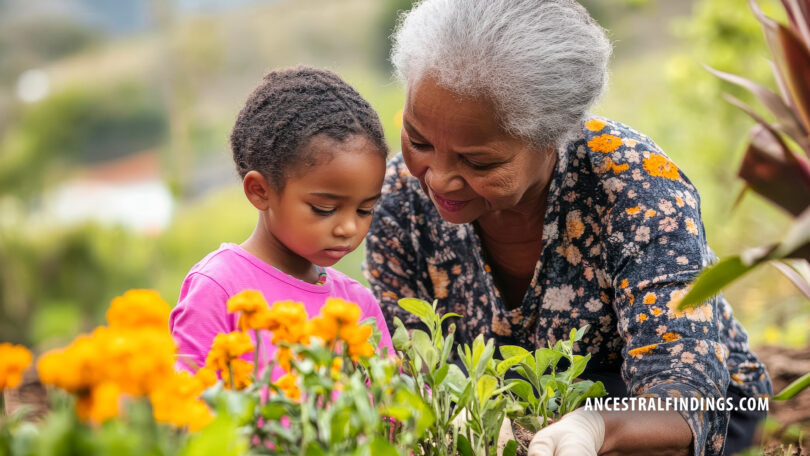In the world of genealogy, it can sometimes feel like the women in your family tree slip into the shadows, often overshadowed by male ancestors whose surnames are passed down through generations. But don’t be fooled—women were central to family history, community life, and the transmission of culture. Tracing maternal lineages in South Africa can reveal many untold stories and hidden connections, even though the path may not always be straightforward.
Let’s explore the challenges of uncovering women in genealogical records while highlighting the methods and resources that can help you bring these forgotten ancestors to light.
The Challenge of Tracing Maternal Lines
In many cultures, including South Africa’s, surnames typically followed the male line, making it tricky to track women’s family histories. This is especially true when a woman changed her surname upon marriage or when records simply referred to her by her husband’s name, as was often the case in the 18th and 19th centuries.
For example, church records or legal documents might list a woman only as “Mrs. [Husband’s Surname],” leaving you without her maiden name—a key piece of information if you want to trace her origins. But every genealogist knows there’s always a way to get around the roadblocks, and when it comes to uncovering maternal lineages, the trail often starts with marriage records.
Looking at Marriage and Church Records
Marriage records can often unlock the door to a woman’s past. In South Africa, churches were the primary record-keepers for most marriages, particularly before the establishment of civil registration in the late 1800s. These records usually include the bride’s maiden name, giving you the first clue to her identity before marriage.
Records from the Dutch Reformed Church, for instance, not only listed the bride and groom’s names but often also included details about their families. This can give you a glimpse of the bride’s family of origin, especially in Afrikaans and Dutch communities, where these records often span back centuries. In some cases, marriage records also note the parents’ names, directly linking to another generation.
Marriage records from the Anglican and Catholic churches, which were common among British and Indian communities, can similarly provide insights into the bride’s background. If a woman’s name changes after marriage, these records offer a way to reconnect her to her family of birth.
Digging into Estate and Will Records
While women may have been less visible in some early records, their presence is often recorded in estate and will documents. In South African history, estates were typically handled through legal processes, and even if a woman’s estate was recorded under her husband’s name, the documents often listed her children and extended family.
This is where estate files become a treasure trove. These records may include property and financial details and familial connections. For instance, a will might mention siblings, parents, or even grandparents, offering a view of the family from multiple angles.
Estate records can be accessed through South Africa’s National Archives or provincial archives. Sometimes, they offer more detail than you’d expect, especially if the estate included significant property or if there were disputes about inheritance.
Turning to Census and Voter Rolls
In South Africa, historical census records were less detailed than in other countries, but later records from the 20th century provide a clearer picture, especially voter rolls. Women gained the right to vote later than men, but once they were included in voter lists, these documents often revealed helpful details, such as their marital status or the address where they lived.
While census records may show women primarily in relation to their husbands or fathers, later electoral records list women by name, making it easier to track them as independent individuals, particularly after they gained voting rights. This can also reveal their socioeconomic status and location at different life points.
Visiting Cemeteries for Gravestone Clues
Gravestones can sometimes say what records do not. South African cemeteries often include inscriptions listing a woman’s full name, maiden name, and married name. In older cemeteries, gravestones might also include the names of her parents or children, offering further clues to follow.
Cemetery records, which are now often digitized or accessible online through databases like Find A Grave, can be a goldmine for genealogists trying to track maternal ancestors. Family plots sometimes include multiple generations, offering the possibility of tracing the lineage of several family members at once.
Family Bibles and Oral Histories
In the absence of official records, many families turned to personal documentation. Family bibles were often passed down through generations and frequently contained handwritten records of births, marriages, and deaths. This type of document can be an invaluable resource for a genealogist, particularly when it records both maiden and married names.
Oral histories play an equally important role, especially among South Africa’s indigenous communities. Many families have passed down stories and family lineages verbally. Speaking with older relatives might provide the missing pieces in your family tree, filling in gaps that formal records don’t cover.
In some cultures, women played a significant role in maintaining family history through oral traditions. By engaging with community elders or family members, you can uncover details about female ancestors that have been preserved through stories rather than official documentation.
Property and Land Ownership Records
While land ownership in South Africa was historically dominated by men, women sometimes held property as widows or unmarried daughters. These records can provide a unique view of women’s roles within their communities, especially in rural areas where farms were passed down within families.
Land deeds and transfers, available through the Deeds Office, can occasionally reveal connections to women who were involved in property transactions or inherited land from their family of origin. These records can add another layer to your understanding of your maternal ancestry.
Using DNA Testing for Maternal Lineages
In the modern era, DNA testing is one of the most powerful tools available for tracing maternal ancestry. Mitochondrial DNA (mtDNA) testing traces the maternal line, providing a direct connection to a woman’s maternal ancestors going back generations. This type of testing is especially helpful when traditional records are scarce or incomplete.
DNA results can reveal connections to distant relatives who may have more detailed genealogical records, helping to fill in the gaps where written documentation is lacking. It can also uncover new branches of the family tree you didn’t know existed, connecting you to maternal ancestors from different regions of South Africa or even across borders.
Women may not always appear as prominently in genealogical records as their male counterparts, but their stories are just as vital. By exploring marriage records, wills, gravestones, and even DNA results, you can uncover the lives of the women who shaped your family history. Each record holds a clue and piece by piece; you can assemble a more complete and richer picture of your maternal lineage.
Suggested Reading for Further Exploration
Here are some helpful resources for those researching the challenges and rewards of tracing maternal lineages in South Africa.
Guide to South African Genealogical Research by Sheila Margaret Zinn
This book offers a practical guide for genealogists researching South African ancestry. It covers vital records, church documents, and immigration files.
History of South Africa by Leonard Thompson
This highly respected history book offers the context needed to understand the social and political environment your ancestors lived in, providing background information that enhances genealogical research.
Handbook for Genealogical Research in South Africa by R.T.J. Lombard
This book, available on Amazon, offers detailed guidance on researching family history in South Africa. It covers various genealogical resources, including church, civil, and immigration records.







